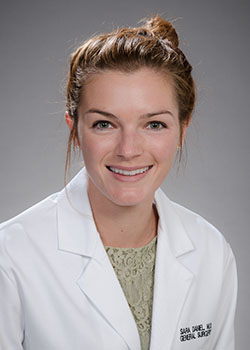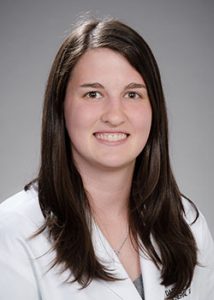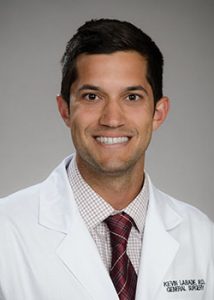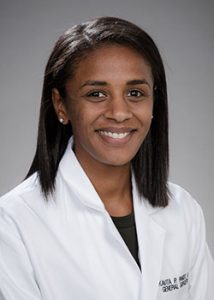Research Resident Past Projects 2018 - 2020

Sara Daniel, MD, 2018-2020
Dr. Daniel is working with the newly created University of Washington Tumor Immunonology and Microenvironment (UW TIME) lab group, which comprises multiple faculty from the Departments of Surgery, Medicine, and Pathology. Building off previous work by lab members on the tumor slice culture model, Dr. Daniel's primary focus is evaluating the effects of hypoxia on the cancer microenvironment, particularly the immunosuppressive effects exhibited by the stroma and infiltrating lymphocyte phenotypes. While immunotherapy has previously had limited effects on pancreatic adenocarcinoma and other solid tumors, a better understanding of the interactions between tumors as well as the spatial relationships and metabolism of cells in the tumor environment will allow combination immunotherapy to activate intratumoral T cells. She is also working on a clinical trial with her primary mentor, Dr. Venu Pillarisetty, evaluating the effects of a somatostatin analogue on leak rates after pancreatic surgery.

Dara Horn, MD, 2018-2020
Dr. Horn is a research fellow in the T32 Postdoctoral Research Fellowship in Trauma and Burns under the mentorship of Dr. Grant O'Keefe, Professor in the Division of Trauma, Burn, and Critical Care Surgery. She will be focused on translational research, applying advances in nutrition and metabolomics to improve the outcomes and care of critically ill and injured patients, and ultimately provide more personalized therapy options. During this time, Dr. Horn will also pursue a Master of Science degree in Epidemiology through the UW School of Public Health, with a focus on clinical research methods. After residency, she plans to pursue a fellowship in trauma and critical care.

Kevin Labadie, MD, 2018-2020
Dr. Labadie has two distinct projects relating to diagnosis and treatment of cancer of the digestive system under the mentorship of Drs. James Park, Professor, Division of General Surgery and Venu Pillarisetty, Professor, Division of General Surgery. With Dr. Park, he is developing an antibody-directed theranostic platform for diagnosis and treatment of Hepatocellular Carcinoma (HCC), the most common form of liver cancer. Their team has successfully conjugated an antibody specific to HCC to different radioisotopes including Zirconium-89 (Zr-89) and Yttrium-90 (Y-90) for immuno-positron emission tomographic imaging and cytotoxic radioimmunotherapy respectively. In an orthotopic xenograft tumor model, Dr. Labadie has demonstrated the ability to detect, treat and surveil tumors with the same antibody conjugated to Zr-89 or Y-90. Under mentorship of Dr.Venu Pillarisetty in the UW Tumor Immune Microenvironment (UW TIME) lab, Dr. Labadie is utilizing a tumor slice culture model to study the local immune microenvironment in pancreatic adenocarcinoma and colorectal liver metastasis with an emphasis on evaluating efficacy of genetically engineered macrophages to enhance antitumor immunity of tumor infiltrating leukocytes through production of interleukin-12.

Kavita Pandit, MD, 2018-2020
Dr. Pandit is a trainee in the NIDDK-funded T32 fellowship in Gastrointestinal Surgical Outcomes Research at the Surgical Outcomes Research Center (SORCE) under the direction of Dr. David Flum, Professor in the Division of General Surgery. Her research interests span multiple clinical areas, though she will focus on health disparities in surgical care across a variety of settings and populations. During this two year fellowship, Dr. Pandit will also be enrolled in the Master's in Public Health program at the University of Washington with a focus on health services. This advanced coursework will help her develop knowledge of research methodology and data analysis. She plans to eventually pursue a fellowship and career in colorectal surgery.
